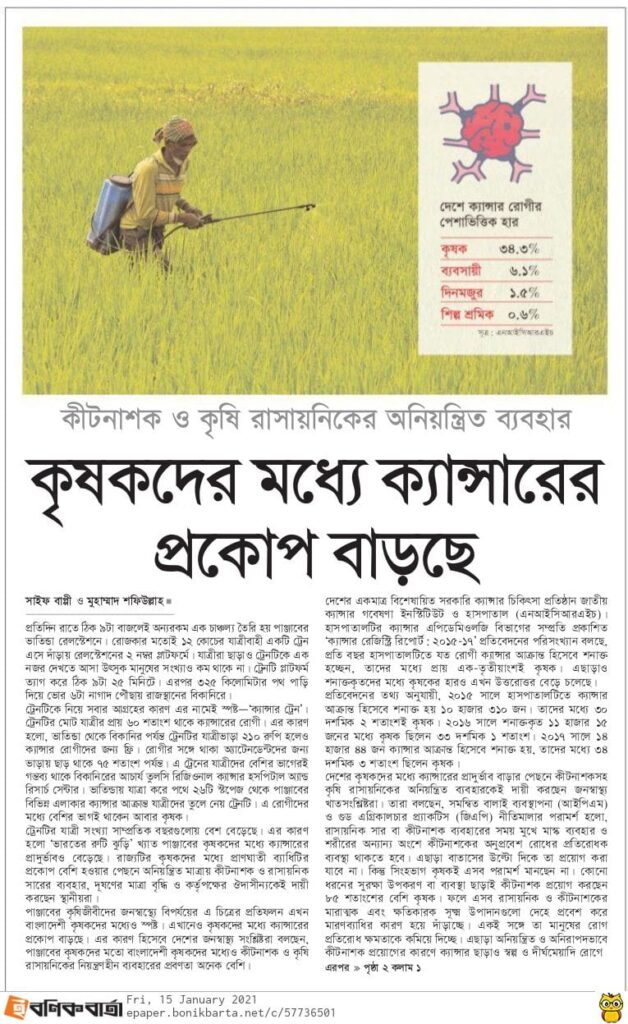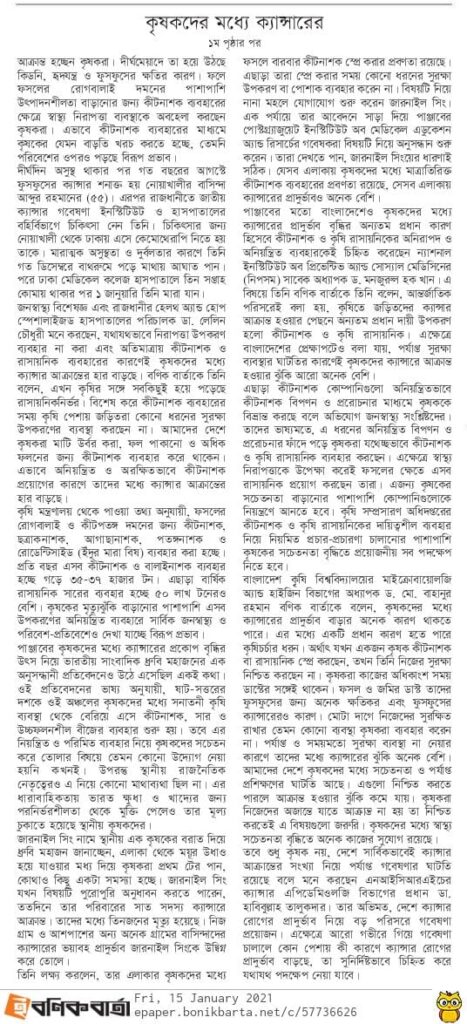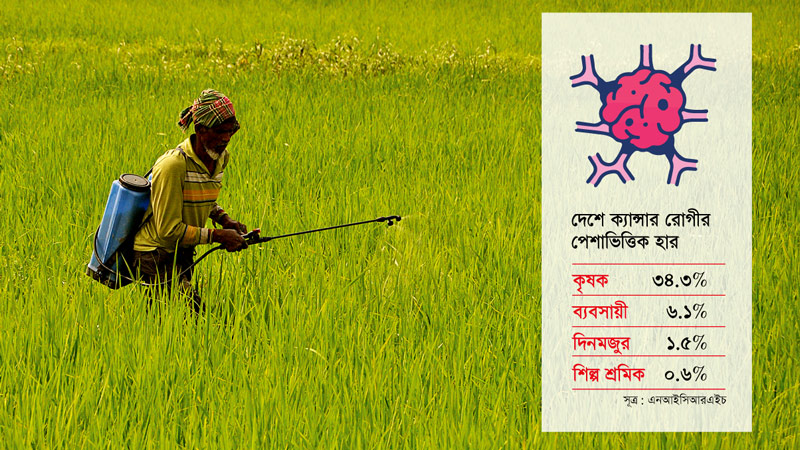Every night at exactly 9 o’clock, a different sensation arises at Bhatinda railway station in Punjab. As usual, a 12-coach passenger train arrives at platform number 2 of the railway station. Apart from the passengers, a considerable number of curious onlookers gather to catch a glimpse of the train. The train departs from the platform at exactly 9:25. After traveling 325 km, it reaches Bikanir in Rajasthan at 6 am.
The reason for everyone’s interest in the train is clear from its name – the ‘Cancer Train.’ About 60 percent of the train’s passengers are cancer patients. This is because the train fare from Bathinda to Bikanir is Rs 210, but it is free for cancer patients, with up to a 75 percent discount on fares for attendants accompanying the patient. Most of the passengers of this train have the Acharya Tulsi Regional Cancer Hospital and Research Center in Bikanir as their destination. The train picks up cancer patients from different areas of Punjab at 26 stops en route to Bathinda. The majority of these patients are farmers.
The number of passengers on the train has increased considerably in recent years. This is because the incidence of cancer has also risen among farmers in Punjab, known as the ‘breadbasket of India.’ Locals attribute the high incidence of the deadly disease among the state’s farmers to the uncontrolled use of pesticides and chemical fertilizers, increasing levels of pollution, and the apathy of the authorities.

The consequence of this disastrous situation on the public health of Punjab’s agriculturists is now evident among Bangladeshi farmers as well. Here, too, the incidence of cancer among farmers is increasing. According to the country’s public health officials, the uncontrolled use of pesticides and agricultural chemicals is widespread among Bangladeshi farmers, similar to Punjab farmers.
The National Institute of Cancer Research and Hospital (NICRH) is the only specialized government cancer treatment institution in the country. According to the recently published ‘Cancer Registry Report: 2015-17’ report of the Cancer Epidemiology Department of the hospital, about one-third of the patients diagnosed with cancer in the hospital every year are farmers, and the proportion of farmers among those identified is steadily increasing.
According to the report, 10,310 people were diagnosed with cancer in the hospital in 2015, with 30.2 percent of them being farmers. Among the 11,115 people identified in 2016, 33.1 percent were farmers. In 2017, 14,044 people were diagnosed with cancer, with 34.3 percent of them being farmers.
The public health sector blames the uncontrolled use of pesticides and agricultural chemicals for the increase in the prevalence of cancer among the country’s farmers. They emphasize the importance of following Integrated Pest Management (IPM) and Good Agricultural Practice (GAP) principles, such as using face masks while using chemical fertilizers or pesticides and taking preventive measures to avoid pesticide penetration into other parts of the body. However, most farmers do not adhere to these recommendations. More than 85 percent of farmers apply pesticides without any protective equipment or system. As a result, the harmful elements of these chemicals and pesticides enter the body and lead to fatal consequences. Additionally, the immune systems of individuals are compromised. Apart from cancer, farmers suffer from short- and long-term illnesses due to the uncontrolled and unsafe use of pesticides, leading to kidney, heart, and lung damage in the long run. This neglect of health and safety measures in pesticide use not only increases healthcare costs for farmers but also has adverse effects on the environment.

Abdur Rahman (55), a resident of Noakhali, was diagnosed with lung cancer in August last year after being ill for an extended period. He received treatment at the National Cancer Research Institute and the outpatient department of the hospital in the capital. He had to travel from Noakhali to Dhaka for treatment and chemotherapy. However, due to severe illness and weakness, he fell in the bathroom last December and sustained a head injury. He later died on January 1 after being in a coma for three weeks at the Dhaka Medical College Hospital.
Dr. Lelin Chowdhury, a public health expert and director of Health and Hope Specialized Hospital in the capital, believes that the rate of cancer among farmers is increasing due to the improper use of safety equipment and excessive use of pesticides and chemicals. He emphasized that agriculture has become heavily reliant on chemicals, with farmers not provided with any protective equipment during pesticide use. He stated that the rate of cancer is increasing among farmers due to the uncontrolled and unprotected use of pesticides, which are used for soil fertilization, fruit ripening, and yield enhancement.
According to information from the Ministry of Agriculture, pesticides, fungicides, herbicides, insecticides, and rodenticides (rat poison) are used to control crop diseases and pests, with an average annual usage of 35-37 thousand tons of these chemicals. Additionally, the annual use of chemical fertilizers exceeds 5 million tons. In addition to increasing the risk of death for farmers, the uncontrolled use of these materials has adverse effects on overall public health and the environment.
The same findings were reported in an investigative report by Indian journalist Dhruvi Mahajan on the source of the rising incidence of cancer among farmers in Punjab. According to the report, in the 1960s and 1970s, farmers in the region shifted away from traditional farming systems and started using pesticides, fertilizers, and high-yielding seeds. However, no initiative has ever been taken to make farmers aware of their controlled and moderate use. Moreover, the local political leadership did not address this issue, resulting in India’s freedom from hunger and food dependency, but at the cost borne by local farmers.
Quoting Jarnail Singh, a local farmer, Dhruvi Mahajan states that the farmers first realized that there was a problem somewhere with the disappearance of peacocks from the area. By the time Jarnail Singh fully comprehended the matter, seven members of his family were affected by cancer, three of whom died. The alarming outbreak of cancer in his village and many other nearby villages worries Jarnail Singh.
He observed that farmers in his area had a tendency to repeatedly spray pesticides on crops and did not use any type of protective equipment or clothing while spraying. Jarnail Singh began discussing the matter in various circles. Eventually, researchers from the Postgraduate Institute of Medical Education and Research in Punjab started investigating the matter in response to his application. They found that Jarnail Singh’s idea was correct: areas where farmers tend to overuse pesticides also have a higher prevalence of cancer.
Former professor of the National Institute of Preventive and Social Medicine (NIPSOM), Manjurul Haque Khan, identified the unsafe and uncontrolled use of pesticides and agricultural chemicals as one of the main reasons for the increase in the prevalence of cancer among farmers in Bangladesh, similar to Punjab. In this regard, he stated that internationally, pesticides and agricultural chemicals are recognized as major factors responsible for cancer among those involved in agriculture. In the context of Bangladesh, it can be said that due to the lack of adequate protection systems, the risk of farmers being affected by cancer is much higher.
Additionally, public health officials have alleged that pesticide companies are misleading farmers through uncontrolled marketing and promotion of pesticides. According to them, farmers are indiscriminately using pesticides and agrochemicals, ignoring health and safety measures, due to unregulated marketing and incentives from these companies. To address this issue, companies should be brought under control, and awareness among farmers should be increased through regular campaigns on the responsible use of pesticides and agricultural chemicals by the Directorate of Agricultural Extension.
Professor of the Microbiology and Hygiene Department of Bangladesh Agricultural University, Md. Bahanur Rahman, mentioned several reasons for the increase in the prevalence of cancer among farmers. One major factor is the type of farming practices, where farmers do not ensure their own protection while spraying pesticides or chemicals, leading to lung cancer caused by harmful dust from crops and land. Lack of awareness and adequate training among farmers contributes to the high risk of cancer among them. Increasing health awareness among farmers could create job opportunities and reduce the risk of infection.
However, there is a lack of sufficient research not only among farmers but also in the country as a whole regarding the number of cancer patients, according to Dr. Habibullah Talukdar, the head of the Cancer Epidemiology Department of NICRH. He emphasized the need for large-scale research on cancer prevalence in the country to identify the professions with increasing cancer rates and take appropriate action.

